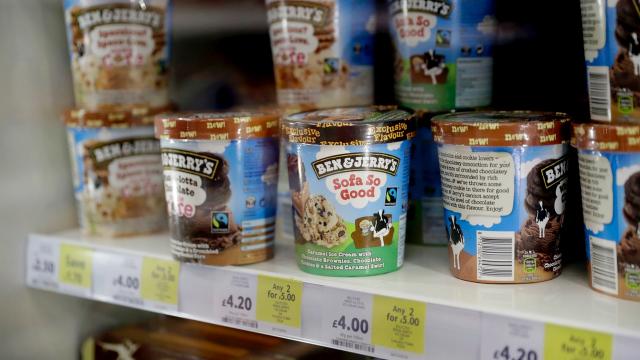Unilever, one of the largest consumer goods companies in the world, is threatening to pull advertising from Google, YouTube and Facebook if the tech giants don’t rid their platforms of extremism, hate speech and fake news. Unilever is particularly disturbed by its ads showing up in videos that sexualise and exploit children.
Photo: AP
Unilever owns everything from food brands such as Ben & Jerry’s, Hellman’s, Bertolli and Lipton to personal hygiene brands such as Dove, Vaseline, Axe and St Ives. And the company’s chief marketing officer, Keith Weed, is expected to formally threaten to pull its advertising later today at the Interactive Advertising Bureau conference in Palm Desert, California, near Joshua Tree National Park.
“Unilever will not invest in platforms or environments that do not protect our children or which create division in society, and promote anger or hate,” Weed is expected to say, according to a copy of his speech that was released to news outlets such as The Guardian and Wall Street Journal.
Whether the company actually does pull any ads remains to be seen, but threats from Unilever won’t be taken lightly. The company is the world’s second largest advertiser, right behind Proctor & Gamble, the company that makes the other half of virtually everything Americans consume – with its brands including Crest, Herbal Essences, Dawn, Charmin and Mr Clean, just to name a few.
Unilever spent $US9 billion ($11.5 billion) globally on advertising last year. And with more of those dollars moving to the digital space, Big Tech depends on those billions if it wants to keep growing.
“As one of the largest advertisers in the world, we cannot have an environment where our consumers don’t trust what they see online,” Weed is expected to say.
“And we cannot continue to prop up a digital supply chain – one that delivers over a quarter of our advertising to our consumers – which at times is little better than a swamp in terms of its transparency.”
A swamp? Where have we heard that kind of language before?
Digital platforms such as YouTube, owned by Google’s parent company Alphabet, have come under increased pressure during the past year to police content considered extremist or inappropriate for minors. Most recently, YouTube star Logan Paul has been disciplined over a video where he livestreamed the corpse of someone who had died by suicide in Japan. Paul took a short hiatus, before returning to taser a dead rat and perform mock CPR on a live fish. YouTube temporarily suspended ads on Paul’s channel as punishment.
But it isn’t just Logan Paul who’s causing headaches for these platforms. Advertisers are increasingly concerned about being associated with internet mediums that thrive on trickery. In some cases, kids are being tricked into watching disturbing, surrealist videos that are marketed as child-friendly. And in other cases, platforms such as Google and Facebook are key drivers in spreading fake news.
YouTube has tried to address its political problems by posting a notice to American users when they’re watching state-sponsored “propaganda” such as the Kremlin-funded RT. But so far it hasn’t instituted similar warnings for propaganda outlets such as Alex Jones’ Infowars and the White House’s favourite cheerleaders, Fox News, which spread dangerous conspiracy theories and racist hate.
Just take a look at this awkwardly racist transition from Jesse Waters back in August of 2017:
Facebook has also had its share of problems involving financial scams, especially when it comes to get-rich-quick schemes such as cryptocurrencies. To say nothing of the fake news (both foreign and home-grown) that has been rampant on Facebook during the Trump era.
As the Wall Street Journal notes, Proctor & Gamble made a threat similar to Unilever’s last year, though change has come rather slowly when it comes to policing extremist content. At the time P&G seemed most concerned that its ads were showing up on propaganda videos for ISIS.
Long story short? The internet’s largest platforms are a mess and a company such as Unilever might finally force companies like Google and Facebook to get their act together. The downside? It might not be such a great idea to have the makers of Dove deciding what adults can and cannot consume online. Logan Paul is bad, but I don’t know that Hellman’s Mayonnaise Hour should be the only alternative.
